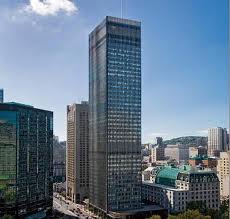
[Updated Oct 2020] A guide to serviced offices and office space to rent in Quebec City as well as general information that may be useful if you are thinking of renting office space in Quebec City.
For further offices information or to search office space for rent in Quebec City just click. Or contact us for any other query.
History & Geography
The capital of the Canadian province of Quebec is one of the oldest cities in North America and one of the most unique. Quebec City is located where the Saint Lawrence River narrows before it meets the St Charles River, on the Cap-Diamant promontory. It was given its name from the Algonquin word Kebec, meaning ‘where the river narrows’. Quebec City has a turbulent history and has often been at the heart of events which dictated the fate of the North American continent. The city was founded by the French explorer Samuel de Champlain in 1608 and by 1665 the settlement had grown to 550 people, many of whom were Jesuit priests and Ursulines nuns. In 1759 the settlement was captured by the British during the French and Indian War. During the conflict, the city was the site of three major battles between the French and British which ended in the French ceding Quebec City to the British permanently in 1763. During the American Revolution, the American colonists attacked Quebec City in hopes that Canada would become part of the United States. The attack was repulsed and American hopes of uniting with Canada were dashed forever, thus ensuring the split of North America into two distinct countries. Following the battle, the British built the Citadelle of Quebec, a fort which housed a sizable British garrison until 1871. The Province of Canada was formed in 1840 and for some time Quebec City was its capital. In 1867 Ottawa was chosen to be the capital of the Dominion of Canada and in the same year, Quebec City became the capital of the Province of Quebec. During the 20th century, the city continued to expand and modernize. Unlike Montreal, which is considered bilingual, Quebec City remained largely Francophone.
Economy
The main industries in Quebec City are tourism, defence, commerce, services, public administration and transport. Currently, the largest employer in the city is the provincial government with 27,900 employees. Unemployment in Quebec City is 4.5 percent and is generally lower than the national average. The city has a fairly large manufacturing industry producing pulp and paper, processed food, metal and wood products, chemicals and electrical equipment. A range of major Canadian companies has their headquarters in the city, many of which are in the insurance sector, including Industrial Alliance, La Capitale, Promutuel, SSQ and Union Canadienne. Additionally computer game companies Frima Studio, Beenox and Sarbakan are headquartered in the city, along with marketing firms Vision 7 and Cosette. Desjardins is the largest financial services employer. Defence technology firm Technopole Defence and Security is also a large employer in the city. Tourism has also become important to Quebec City, with thousands of visitors drawn to the city’s unique setting, history, architecture and culture every year.
 Tourism
Tourism
Many tourists come to Quebec City to soak in an atmosphere that is unique in North America. Due to its architecture, the city has a more European feel than perhaps any other on the continent. Many of the buildings in Quebec City are made out of stone and its windings streets lined with cafes and restaurants all contribute to the old world feel of the place. Old Quebec or Vieux Quebec as it is called in French is the section of the city within the ramparts located on top of a commanding cliff face. This area was where the governor and wealthy lived. Today the area is a UNESCO World Heritage Site and motor vehicles are banned in the entire area. The old ramparts are still in place as well as many historic buildings. Quebec City is also popular for its Winter Carnival, its Saint Jean-Baptiste Day celebrations and its summer music festival. The area surrounding Quebec City is renowned for its natural beauty and has several tourist attractions including Montmorency Falls, Mont-Sainte-Anne ski resort and the Ice Hotel – the first of its kind in North America. The Parc Aquarium du Quebec is also popular with visitors, featuring over 10,000 different kinds of mammals, reptiles and fish. The park’s polar bears especially are a big draw. Quebec City is a very safe destination for visitors with one of the lowest crime rates in Canada. In the entire year of 2007, the city didn’t report a single murder.
Transport
Due to its relatively modest size, Quebec City is easy to get around. The main form of public transport is the city’s well-used bus lines, though the city is currently considering implementing a tram system to ease overcrowding. Quebec City is served by the Gare du Palais train station through which long-distance trains run regularly. The city’s airport, Jean Lesage International Airport lies in the west of the city and is easily reachable by bus. Quebec City also has a sizable port on the St Lawrence River.
 Office space to rent in Quebec City
Office space to rent in Quebec City
In 2010 Quebec City had an office vacancy rate of 5.6 percent, well below the national average. Over 2009 and 2010 approximately one million square feet of new office space was delivered. This has not had a major detrimental impact on vacancy rates nor has it impacted rents significantly. The city’s high employment rate and fairly recession-proof industries have helped in this regard. Rents in the city remain relatively low, with the average currently standing at approximately CAD 25.91 per square foot for Grade A office space in the city’s CBD. The primary areas for office space in Quebec City are downtown, Saint-Roch and the Upper Town.
Our office space search, advisory and acquisition services are FREE, always. Our Quebec City office space brokers and agents are globally regulated by the Royal Institution of Chartered Surveyors (RICS) ensuring the highest standards of commercial property advice and service at all times.
